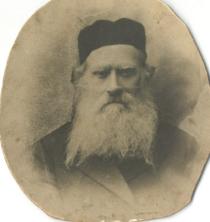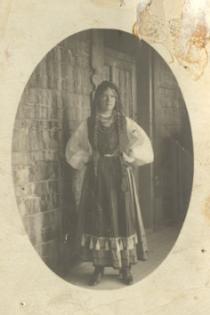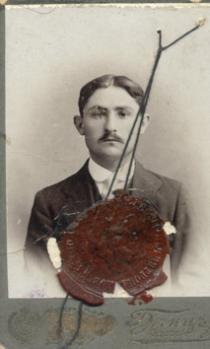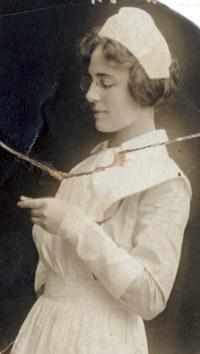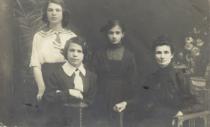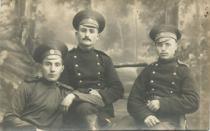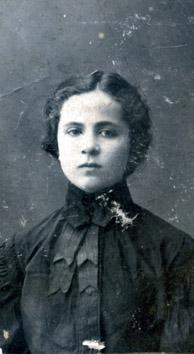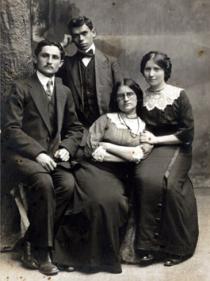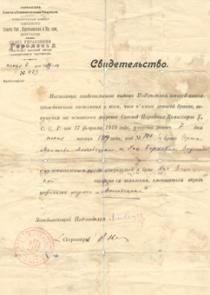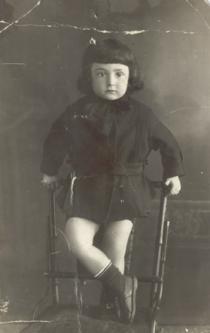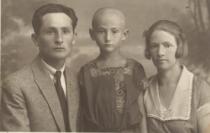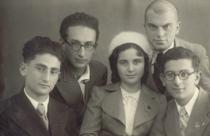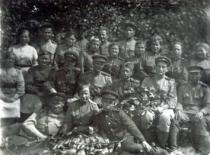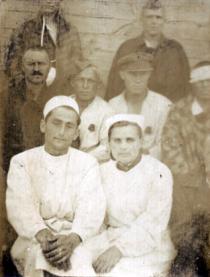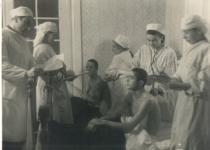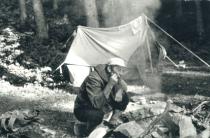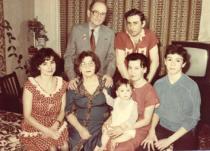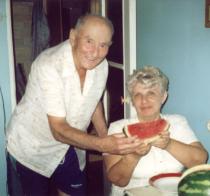This is my maternal grandmother Matlia Yeschina with her children. Sitting from left to right: Sheva Yeschina, grandmother Matlia. Standing Mary Khromaya, Ghenia Yeschina. This photo was taken in 1912 in Odessa.
My maternal grandmother Matlia Yeschina was born in the 1860s in the town of Sosnitsa of Chernigov province. Her maiden name was Garbovitzer. My grandmother finished a public school. In the 1880s she married my grandfather Ber Yeschin. They had 8 daughters. In 1927 my grandmother went to visit three of her daughters in America, but since she left her five daughters here she returned in 1930. Grandmother Matlia lived in the neighboring house in an apartment with her two single daughters. Grandmother Matlia knew Yiddish, but she usually spoke Russian. She wore black clothes and a black shawl. At home she wore a kerchief. She was very religious. On Yom Kippur, when grandmother Matlia spent all day through at the synagogue and fasted she got so weak that my mother and I went to the synagogue to pick her up and had to lead her by her elbows two blocks. She had special crockery to use at Pesach, but she was the only one to use it since her daughters were not religious and didn't observe these traditions. When World War II began, grandmother Matlia didn't want to evacuate however hard her daughters tried to convince her. She said 'Be what may'. Her younger daughter Ghenia stayed with her. My neighbors told me afterward that when Romanians came they took them along with other Jews to powder storages in Tolbukhin Street and burned them in autumn 1941.
My mother's sister Sheva was born in Odessa in 1905. She studied in a Jewish elementary school where she also learned to sew. She was single. She wasn't religious. During World War II she evacuated and worked in a kolkhoz near Tashkent. After the war she returned to Odessa and worked as leading knitwear modeler at the garment factory. There was a knitwear store in Paster Street where aunt Sheva had an office. She was making garments for exhibitions. Once in the middle of the 1960s she was invited to an exhibition in Marseilles, but she flatly refused to go there. She said 'They will crimp me!' [Sheva was afraid of being crimped by foreign intelligence.] At first I laughed at those fears of hers, then I tried to make her change her mind, but it didn't work. In the last years of her life she had severe sclerosis and we had to keep her under permanent watch of a medical nurse in a center of the Black Sea shipyard. Our distant relative helped aunt Sheva to get there and after she died in 1991 this relative got her apartment. Sheva was buried in the Tairovskoye [town international] cemetery.
My mother's sister Mary was born in Odessa in 1900. She had some education. In the early 1920s aunt Mary who was one of the best employees in the garment industry in an enterprise in Odessa, was elected a member of the town council. Aunt Mary wore trendy clothes that she made herself. She got married at the age of 30 in 1934 to Rafail Khromoy. Rafail worked in the Zagotzerno [grain supplies] system and I suspect he did some dealing and wheeling there. In 1935 their daughter Ella was born. During World War II Ella and her daughter evacuated. Ella worked in a kolkhoz near Tashkent. Rafail flatly refused to evacuate hoping to start his own business when Germans came. His neighbors told us that he perished in the ghetto. After the war Mary and her daughter returned to Odessa. Aunt Mary worked at the garment factory. Ella finished 7 years at school and went to work in the sales department of the resistance unit plant. Ella married Victor Levin, a Jewish man. Victor worked in the accounting office at the plant and did some swindling ; he paid salaries under forged payrolls. He was imprisoned for doing this. Aunt Mary died of lung cancer in 1968. Ella and her children - her husband had died before - moved to New Zealand in 1980 and then to Sydney.
My mother's youngest sister Ghenia was born in Odessa in 1908. Se was a typist in an office. She was single. I remember that she was a whining and lamenting type. When I became a doctor I diagnosed that she had a Graves' disease that provoked such behavior. [It is an autoimmune disorder resulting from a combination of genetic and environmental factors, the most common symptoms of it are nervousness and anxiety.] Ghenia perished with grandmother Matlia in Odessa in 1941.

